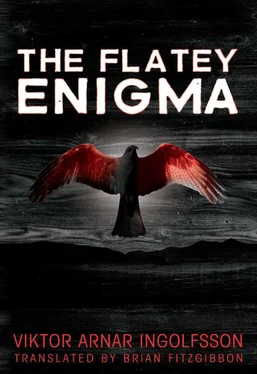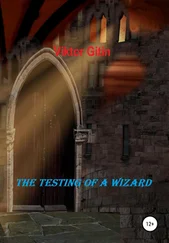Viktor Ingolfsson - The Flatey Enigma
Здесь есть возможность читать онлайн «Viktor Ingolfsson - The Flatey Enigma» весь текст электронной книги совершенно бесплатно (целиком полную версию без сокращений). В некоторых случаях можно слушать аудио, скачать через торрент в формате fb2 и присутствует краткое содержание. Жанр: Триллер, на английском языке. Описание произведения, (предисловие) а так же отзывы посетителей доступны на портале библиотеки ЛибКат.
- Название:The Flatey Enigma
- Автор:
- Жанр:
- Год:неизвестен
- ISBN:нет данных
- Рейтинг книги:5 / 5. Голосов: 1
-
Избранное:Добавить в избранное
- Отзывы:
-
Ваша оценка:
- 100
- 1
- 2
- 3
- 4
- 5
The Flatey Enigma: краткое содержание, описание и аннотация
Предлагаем к чтению аннотацию, описание, краткое содержание или предисловие (зависит от того, что написал сам автор книги «The Flatey Enigma»). Если вы не нашли необходимую информацию о книге — напишите в комментариях, мы постараемся отыскать её.
The Flatey Enigma — читать онлайн бесплатно полную книгу (весь текст) целиком
Ниже представлен текст книги, разбитый по страницам. Система сохранения места последней прочитанной страницы, позволяет с удобством читать онлайн бесплатно книгу «The Flatey Enigma», без необходимости каждый раз заново искать на чём Вы остановились. Поставьте закладку, и сможете в любой момент перейти на страницу, на которой закончили чтение.
Интервал:
Закладка:
“We can think about it over the summer and decide in the fall,” said the housewife, and then she concentrated on the game.
“Yes, but I think we should go for it,” said Gudjon. He found it difficult to focus on the chess and conduct a conversation at the same time. He looked at the board in confusion and finally played his knight.
Hildur promptly slid her rook down the board: “Checkmate!”
Question fourteen: They chose the spots to fall on. Seventh letter. The Baglar were being besieged by King Sverrir at the rock of Tunsberg. The Baglar saw banners from two armies. One came from Frod’s Ridge, the other from the town. They fought when they met; some fell and others fled. The Baglar then urged Hreidar to abandon the rock and assist their men. Hreidar answered, “Let’s see what they do first and if the Birkibeins are chased to the trench.” And then he added, “There is something odd about the way they are fleeing. It seems to me that they’re playing a trick on us. Do you notice how they choose dry spots to fall on or else fall on their shields? And do you see any sign of blood on their weapons or garments? No! Neither do I,” he said. “This must be one of Sverrir’s ruses.” The answer is “Birkibeins,” and the seventh letter is e.
CHAPTER 31
Sunday, June 5, 1960
The state radio made sure all Icelanders realized Whitsunday was on its way. Psalms bellowed out of Ingibjorg’s radio, filling the district officer’s home. The radio choir was singing Icelandic Whitsunday psalms.
It was still bright and slightly cloudy over Breidafjordur, and the wind had subsided and seemed to be turning. The farmers scrutinized the sky above and forecast good weather for the day and then rain in the evening. That wasn’t such a bad thing, since the fields needed a sprinkle. The wells were also running low. But it would be good if the dry weather could hold up during the day while the church guests were walking about.
A festive atmosphere had spread across the village by the time Kjartan descended from the loft at around ten and peered outside. Grimur had put on his dark Sunday best, and he looked washed and shaven. His mop of hair was combed back, and he had brushed his bushy beard. Ingibjorg was wearing a pretty bodice and had sprayed herself with perfume. Pastries were served with the morning coffee.
The national flag had been hoisted on the high flagpole in front of the church and flapped gently in the warm breeze. Here and there people could be seen strolling about, but no one was working. Days of rest were sacred, especially Whitsundays.
Through the kitchen window, Grimur watched motorboats loaded with church guests from the inner isles approaching the strait between Hafnarey and Flatey.
“It used to be a more impressive sight back in the days when the island boats came to mass under lily-white sails. I think the good Lord probably preferred that,” he said wistfully in between the names of the boats he was rattling off, as well as the names of those who were probably on board. Every now and then he lifted an old pair of binoculars to his eyes to confirm the identity of a person he had already guessed.
“Yes, yes, I knew it, that’s the Skaley boat,” he said smugly.
The travelers made the crossings in the boats in their everyday clothes, but carried church clothes with them in suitcases, as well as picnics in chests and flasks of coffee. People stepped ashore on Eyjolfur’s pier and vanished into the houses of friends and relatives only to reappear in the village again a short time later, dressed in their festive clothes. Some knocked stealthily on Asmundur the storekeeper’s window, and he ushered them into the store through the back door on the eastern side of the building. The store was naturally closed on holy mass days, but he could always make an exception for people in dire need. The co-op, on the other hand, was firmly locked since it was next door to the vicarage and the priest himself was a member of the company’s board.
Hogni, the organist, rounded up all the choir members once all the boats had arrived and walked ahead of the group up to the church. They were supposed to rehearse before the mass.
At one thirty, the deacon, Thormodur Krakur, left his home in his Sunday best and crossed the village towing his cart with his wife, Gudridur, sitting flat out on top of it. When they reached the vicarage, the priest and his wife appeared ready for the mass, and the four of them went to the church.
Ingibjorg was a member of the church choir and had vanished with the organist as soon as she had finished washing up after lunch. Grimur and Kjartan sat in the living room, drinking coffee in silence. Grimur was perusing through the weekly supply of newspapers that had arrived on the mail boat the day before, while Kjartan tackled a puzzle in a Danish weekly and thought of Gaston Lund. He was trying to form a picture of him from the few fragments of information they had gathered.
“Tell me something,” he said to attract Grimur’s attention. “Does anyone know who the father of Gudrun in Innstibaer’s child was?”
Grimur was taken aback. “No. The boy was grown up and had gone off to sea by the time Gudrun moved here to live with Hallbjorg. I’ve never heard the father mentioned.”
“Valdi in Ystakot wrote in his diary that Gudrun’s son came on a boat the day before Gaston Lund went missing.”
Grimur cleared his throat and shook his head. “You’re taking this a bit too far now, pal,” he said.
“And then there’s that word- lucky,” Kjartan said, growing more excited. “That’s the word we think Lund tried to write with the pebbles in Ketilsey, and it also happens to be the name of Sigurbjorn of Svalbardi’s boat. Isn’t he related to Gudrun somehow?”
Grimur seemed apprehensive. “I hadn’t really made that connection, but we should tread very carefully with this and not go blabbing about it to the Reykjavik police.”
“Why not?” Kjartan asked.
“It’s all so far-fetched, and it would go down very badly with the locals here if that kind of gossip were to get around. False accusations can do so much damage.”
Kjartan suddenly shut up. The district officer’s words hit him hard. He should have known.
A second round of church bells prompted the district officer to put down his papers and stand. Clearing his throat again, he said it was time to go. Kjartan followed him. The assumption had been that he would attend the mass like everyone else, and he saw no reason to fuel any controversy by declining to go, although he wasn’t too keen on the idea. He hadn’t been to any masses since his confirmation, apart from some funerals. Maybe this would give him a good opportunity to observe the islanders without being the center of attention.
He walked toward the church with Grimur in a slow and dignified stride, in unison with other groups that were heading the same way. People then huddled around the church entrance and greeted each other on both sides with handshakes and kisses.
Immaculately dressed children were playing on the slope below the church when the Ystakot clan came strolling over. They showed no signs of having dressed up for the occasion. Two boys broke out of the scrum and yelled out, “Nonni dung boy! Nonni dung boy!”
Their fun came to an abrupt end, though, because Hogni, who had just stepped out of the church to catch a breath of fresh air after the choir practice and was standing a short distance away, angrily snapped at them and they fell into a shamed silence.
“What was that they called the boy?” Kjartan asked.
“Dung boy,” Grimur answered.
“What do they mean?”
“Cow dung is an excellent fuel that used to be used as tinder for fires with dry bird skin. Nowadays most houses use paraffin oil, but not so long ago dung was the most common local tinder. They still use the old method in Ystakot, and little Nonni’s job in the spring is to go around the sheds collecting cow dung to make tinder. He leaves it out in the fields in small cakes and allows it to dry. Everyone of my generation did the same as kids, and it was regarded as a perfectly respectable task. But now they’ve nicknamed him ‘dung boy.’ Hardly what you’d call progress.”
Читать дальшеИнтервал:
Закладка:
Похожие книги на «The Flatey Enigma»
Представляем Вашему вниманию похожие книги на «The Flatey Enigma» списком для выбора. Мы отобрали схожую по названию и смыслу литературу в надежде предоставить читателям больше вариантов отыскать новые, интересные, ещё непрочитанные произведения.
Обсуждение, отзывы о книге «The Flatey Enigma» и просто собственные мнения читателей. Оставьте ваши комментарии, напишите, что Вы думаете о произведении, его смысле или главных героях. Укажите что конкретно понравилось, а что нет, и почему Вы так считаете.











